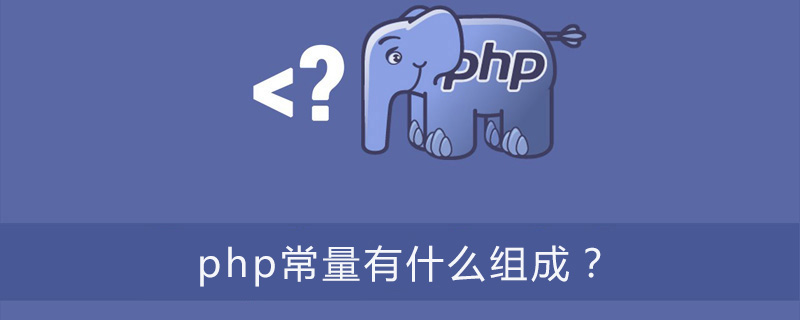What does a php constant consist of?
PHP constant is an identifier of a simple value that cannot be changed in the script; after the constant value is defined, it cannot be changed anywhere else in the script. A constant consists of English letters, underscores, and numbers, but numbers cannot appear as the first letter. (The $ modifier is not required on the constant name).

Note: Constants can be used throughout the script.
Set PHP constants
To set constants, use define() function, functionSyntax is as follows:
bool define ( string $name , mixed $value [, bool $case_insensitive = false ] )
This function has three parameters:
●name: required parameter, constant name, that is, identifier.
● Value: required parameter, the value of a constant.
● case_insensitive: Optional parameter, if set to TRUE, this constant is case-insensitive. The default is case-sensitive.
In the following example we create a case-insensitive constant, the constant value is "Welcome to php.cn":
<?php
// 区分大小写的常量名
define("GREETING", "欢迎访问 php.cn");
echo GREETING; // 输出 "欢迎访问 php.cn"
echo '<br>';
echo greeting; // 输出 "greeting"
?>In the following example we create a case-insensitive constant, the constant value is "Welcome to php.cn":
<?php
// 不区分大小写的常量名
define("GREETING", "欢迎访问 php.cn", true);
echo greeting; // 输出 "欢迎访问 php.cn"
?>Constants are global
After a constant is defined, it defaults to a global variable and can be used throughout the Run the script anywhere it is used.
The following example demonstrates the use of constants within a function. Even if the constant is defined outside the function, the constant can be used normally.
<?php
define("GREETING", "欢迎访问 php.cn");
function myTest() {
echo GREETING;
}
myTest(); // 输出 "欢迎访问 php.cn"
?>The above is the detailed content of What does a php constant consist of?. For more information, please follow other related articles on the PHP Chinese website!

Hot AI Tools

Undresser.AI Undress
AI-powered app for creating realistic nude photos

AI Clothes Remover
Online AI tool for removing clothes from photos.

Undress AI Tool
Undress images for free

Clothoff.io
AI clothes remover

AI Hentai Generator
Generate AI Hentai for free.

Hot Article

Hot Tools

Notepad++7.3.1
Easy-to-use and free code editor

SublimeText3 Chinese version
Chinese version, very easy to use

Zend Studio 13.0.1
Powerful PHP integrated development environment

Dreamweaver CS6
Visual web development tools

SublimeText3 Mac version
God-level code editing software (SublimeText3)

Hot Topics
 CakePHP Project Configuration
Sep 10, 2024 pm 05:25 PM
CakePHP Project Configuration
Sep 10, 2024 pm 05:25 PM
In this chapter, we will understand the Environment Variables, General Configuration, Database Configuration and Email Configuration in CakePHP.
 PHP 8.4 Installation and Upgrade guide for Ubuntu and Debian
Dec 24, 2024 pm 04:42 PM
PHP 8.4 Installation and Upgrade guide for Ubuntu and Debian
Dec 24, 2024 pm 04:42 PM
PHP 8.4 brings several new features, security improvements, and performance improvements with healthy amounts of feature deprecations and removals. This guide explains how to install PHP 8.4 or upgrade to PHP 8.4 on Ubuntu, Debian, or their derivati
 CakePHP Date and Time
Sep 10, 2024 pm 05:27 PM
CakePHP Date and Time
Sep 10, 2024 pm 05:27 PM
To work with date and time in cakephp4, we are going to make use of the available FrozenTime class.
 CakePHP File upload
Sep 10, 2024 pm 05:27 PM
CakePHP File upload
Sep 10, 2024 pm 05:27 PM
To work on file upload we are going to use the form helper. Here, is an example for file upload.
 Discuss CakePHP
Sep 10, 2024 pm 05:28 PM
Discuss CakePHP
Sep 10, 2024 pm 05:28 PM
CakePHP is an open-source framework for PHP. It is intended to make developing, deploying and maintaining applications much easier. CakePHP is based on a MVC-like architecture that is both powerful and easy to grasp. Models, Views, and Controllers gu
 CakePHP Routing
Sep 10, 2024 pm 05:25 PM
CakePHP Routing
Sep 10, 2024 pm 05:25 PM
In this chapter, we are going to learn the following topics related to routing ?
 CakePHP Working with Database
Sep 10, 2024 pm 05:25 PM
CakePHP Working with Database
Sep 10, 2024 pm 05:25 PM
Working with database in CakePHP is very easy. We will understand the CRUD (Create, Read, Update, Delete) operations in this chapter.
 CakePHP Creating Validators
Sep 10, 2024 pm 05:26 PM
CakePHP Creating Validators
Sep 10, 2024 pm 05:26 PM
Validator can be created by adding the following two lines in the controller.






